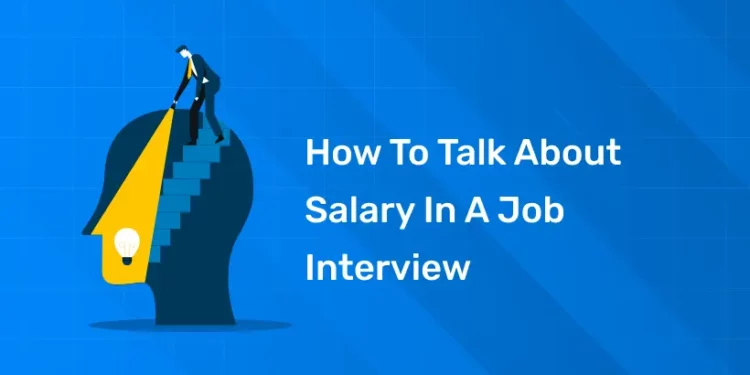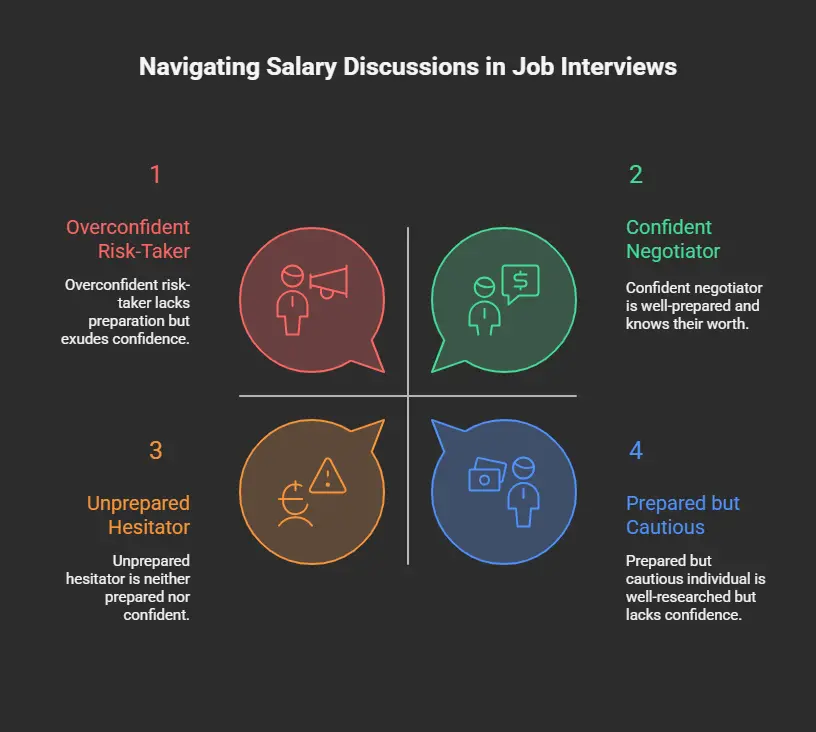Table of Contents
It can be uncomfortable to discuss salary expectation during job interviews, but it plays an important role in ensuring that the job is suitable for both you and the employer. Understanding the right time and way of talking about salary package can promote your confidence and help ensure proper salary for your skills and experience.
In this blog, we’ll walk you through the right time to discuss salary, how to answer questions about your expectations, and tips for handling the conversation professionally. With the right approach, you can talk about salary without stress and move one step close r to getting the job you want.
Begin Your Personality Transformation- Enroll Today!
Introduction
Tips for talking about Salary in an Interview
Discussing salary during a job interview may seem a bit strange, but with the right approach you can handle it confidently and professionally. Here are some easy tips to help you navigate the conversation:
1. Do Your Research First
Before the interview, find out the specific salary limit for the role you are applying. Use websites such as Glassdoor, PayScale or LinkedIn salary details to see what similar post pay in your location and firm. This helps you give you a realistic number if asked.
2. Wait for the Right Time
If possible, let the interviewer bring up salary first. Most employers will talk about pay after learning more about your experience and how well you fit the role. If you’re asked early on, try to redirect by saying you’d like to learn more about the job before discussing salary.
If possible, let the interviewer bring up salary first. Most employers will talk about wages after known more about your experience and how well you want to fit into the role. If you are asked early, try to redirect by saying that you want to know more about the job before discussing wages.
3. Be Ready with a Salary Range
When the topic comes out, remember a salary limit based on your research and experience. For example, you can say, “Depending on my experience and what I know about the role, I look at something within the limits of [mention expected salary]”. Giving a limit shows that you are flexible while you know your ability.
4. Stay Positive and Professional
While discussing salary, speak confidently, but respectfully. Avoid looking very aggressive or tentative. Show that you are interested in work – not just about pay.
5. Think About the Full Offer
Remember that salary are only part of the overall offer. Consider benefits such as health insurance, payment time, remote work alternative, bonus and development opportunities. Sometimes slightly lower salary are balanced with strong benefits.
6. Practice What to Say
This helps you practice your answer so you feel more confident. Try to practice with a friend or write some sentences you are comfortable with. It can have a big impact on your expectations at that moment.
7. Be Honest and Clear
If the interviewer asks about your previous package or expectations, be sincere – but if you aren’t comfortable to disclose it, you do not need to share the exact range. You can say with polite, “I focus more on the value that I bring in this role and discover a salary package that reflects it.”
Boost Your Skills & Kickstart Your Career!
Employability and Personality Development Course by Entri App: Enhance your communication, confidence, and job-ready skills to excel in your career.
Join Now!How to Negotiate your Salary?
-
Negotiating your revenue can make you feel uncomfortable at first, however it’s far a normal part of the hiring process and is a valuable opportunity for you to make sure that you are paid properly.
-
It’s an opportunity to ensure you’re being compensated fairly for your skills, experience, and contributions.
-
Start with research using some websites like LinkedIn or any other, to understand the average salary of the role of your industry and location.
-
When you receive a job offer, take time to evaluate it carefully.
-
If the offer is below your expectations, express gratitude for the opportunity and professionally share your desired salary based on your experience and the value you’ve delivered in the past.
In many cases, employers will appreciate your professionalism and may be ready to meet you half the path or even improve the proposal.
-
If the organization is not able to provide the salary package you are expecting, you should be open to negotiate for other benefits like:
-
Extra vacation days
-
Remote work flexibility
-
Performance bonuses
-
Professional development support
-
-
Be honest, respectful and be professional during communication throughout the negotiation process.
-
A well-prepared negotiation signals confidence, professionalism, and an understanding of your worth.
-
Employers will appreciate your professionalism and may be ready to meet you half the path or even improve the proposal.
Conclusion
Talking about salary package in job interviews should not be unpleasant – it is a common and important part of the hiring process. When anyone approached with preparation and professionalism, it becomes an opportunity to express the value and make sure that the role agrees with your financial expectations.
By doing your research, knowing your ability and being respectable during the conversation, you can safely navigate the wage discussion and even you can negotiate a better offer. Remember that stand up for yourself is not just about money – it’s about finding the right role where your skills are actually appreciated.
| Related Links | |
| Top Communication Skills For A Resume | Verbal Communication Skills: Examples & How To Improve Them |
| Cover Letter Do’s and Dont’s | What Does a Group Leader Do? |
Boost Your Skills & Kickstart Your Career!
Employability and Personality Development Course by Entri App: Enhance your communication, confidence, and job-ready skills to excel in your career.
Join Now!Frequently Asked Questions
When is the right time to bring up salary in a job interview?
It’s usually best to wait until the employer brings it up or after you’ve discussed your qualifications. Typically, salary discussions happen during the later stages of the interview process, such as the second or final interview. Bringing it up too early can make it seem like you’re more interested in pay than the position itself.
How should I respond if the interviewer asks about my salary expectations?
Be honest but flexible. You can provide a range based on your research and experience. For example: “Based on my skills and the market rate for this role, I’m looking for something in the range of [expected salary], but I’m open to discussing what makes sense for the position and the team.”
What if I’m not sure what salary to ask for?
Research is key. Use tools like Glassdoor, Payscale, or LinkedIn Salary to find the typical pay range for your role, location, and experience level. You can also talk to professionals in your industry for insight.
Can talking about salary too soon hurt my chances?
Yes, if it’s brought up too early or without context. Focusing on salary before showing your value might send the wrong message. It’s better to first highlight your skills and interest in the job, then discuss salary when the timing feels right.
How do I negotiate if the salary offer is lower than expected?
Thank the employer for the offer, express your excitement about the role, and politely explain why you believe a higher number is fair. Use facts to back it up—such as market data, your experience, or the scope of the job responsibilities.
Should I discuss salary in a phone or video interview?
Yes, but only if the interviewer brings it up or if the conversation is heading in that direction. If it’s a screening call and salary comes up, it’s okay to give a range and express that you’re open to discussing more later in the process.












